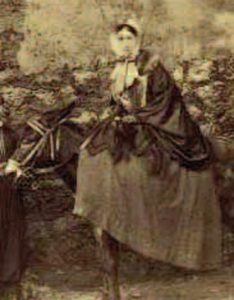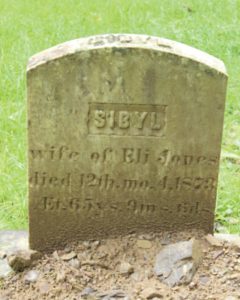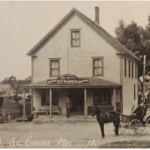With bicentennial nearing, China remembers Sybil Jones
Excerpts from the book Eli and Sybil Jones: Their life and work, written by Rufus M. Jones, in 1889. Submitted by Neil Farrington.

Sybil Jones during one of her missions in Europe. Internet photo
Sybil Jones was at work in the southern states during a part of the year 1860, and returned to her northern home only a few weeks before the attack on Fort Sumter. The sound of war carried sorrow to the hearts of herself and her husband. They were loyal to their country and the great cause of human freedom, but they were loyal also to the Prince of peace.
For years they had longed to see the light of freedom break in on the south, but they had hoped no less for the day “when the war-drum should throb no longer” and universal peace should gladden the long watchers for its dawn. Now they saw the oncoming of a most terrible civil war, threatening the life of the nation. They mourned for mothers and fathers who must see their boys go to the field; they thought of the homes shattered for ever; but they did not yet realize that their eldest son was to go forth to return only on this shield – that the son who had urged them to go forward in the work of love in Liberia, their noble son, was to be demanded as a sacrifice.
The war was hardly begun when James Parnel Jones resolved to volunteer. President Lincoln’s call seemed to call to him. He had been a logical reader of Summer, and had closely watched the development of slavery, and to his mind the war to save our nationality would necessarily free the slaves. He wrote from the South: “Did I not think this war would loose the slave’s chains I would break my sword and go home.”
That it was hard for him to go when his parents were praying for peace, there can be no doubt, but his mind was filled with the thought of saving the life of a nation, and he certainly felt that the path of duty was in that direction.
The members of the Society of Friends felt almost universally that they owed allegiance to two fatherlands. “There was a patriotism of the soul whose claim absolved them from the other and terrene fealty,” and there was a manifest inconsistency between being members of “Christ’s invisible kingdom” and taking arms in support of a dominion measured by acres.
James Parnel came home wounded, but returned to his command before his furlough had expired. He went back with the feeling that the days left him were few: he indistinctly saw what awaited him. In an engagement to carry a strong point held by the enemy at Crystal Springs, near Washington, he was struck by a ball from a sharpshooter. The ball had glanced from a tree and brought him a mortal wound. The two hearts deeply wrung to have their son go into the war at all were pierced at the news of his death.
Henceforth whoever wore a soldier’s uniform had a place in Sybil Jones’ heart. Her unspent love went out to all who were suffering on the field and in the hospitals, and she could not rest at home. Obtaining the needful credentials, she took up in a new form the arduous service of her active and consecrated life, bearing the gospel cheer to the wounded and dying in Philadelphia and Washington. She could tell the soldiers of her own son, and so touch their hearts and her sympathy and love brought joy to many a poor sufferer. The aggregate of her visits shows that she preached and talked to 30,000 soldiers. To and from the field of her labor, at the depots, wherever she saw a uniform, she went to speak gentle words and to bear good news; and only those to whom the balm came can tell the good accomplished.
Soldiers and prisoners welcomed her and those high in power listened with respect to her messages. She comforted the widow of President Lincoln, and twice stood before his successor, President Johnson, and faithfully warned him to rely on the Ruler of the universe for counsel in guiding the helm of state.
She left home in the first month 1865, with a certificate for service. On her way to the field in which she felt called to labor she visited her children in Philadelphia, and attended meeting at Germantown, where she was favored with a gospel message.
She then proceeded to Baltimore accompanied by Lydia Hawkes, of Manchester, Maine. In this city she met her dear husband, who had been separated from her for three months. He was much worn by his labors as distributing agent of the New England Friends. He had distributed to the necessities of the freedman food, clothing, beds, etc., according to the quantity sent to the mission.
Sybil Jones rested a few days, and then commenced the labors for which she was liberated. Her first service was in Judiciary Square. She, with her companion, was taken there in an ambulance, and they were preceded and introduced by their dear friend Jane James, who often gave them like aid. They were pleasantly received, and permission was granted them to perform any religious service. They visited nine wards and had service in the chapel, speaking words of comfort to those confined to their beds. They also went to the hospital at Armory Square, visited all the wards of the sick and wounded, and had chapel service.
Eli Jones went for a short time to Philadelphia to try and gain a little strength, being very weary with his labors among the colored people. The mud was very deep and the work of distributing very hard.
Sybil Jones great earnestness in prayer for the bereaved ones in the far away homes as she was called upon to attend the funerals of the soldiers. Often more than one coffin stood on a form before them.
Columbia Hospital was visited. They were obliged to move from their lodgings on account of sickness in the family, and were most kindly received by their good friends William and Jane James. They found it a great privilege to be so cared for.
They then went to Lincoln Hospital, where there were 5,000 men. At a later visit they found 400 more wounded soldiers from City Point. The afflicted men were all broken down with suffering and were ready for the consolation of the gospel. The field indeed seemed white unto the harvest. A lad told them that he had been in the Crimean War, and had served two years in this. He was an Englishman. He showed them a silver medal gained by valor in the former war Sybil Jones said, “I hope thou art seeking a crown in that higher warfare?” He quickly replied, “I am pressing after it with all my might. I am looking to Jesus as my captain.”
She sighed for “universal peace to reign” as she witnessed the untold miseries of cruel war. Many were passing away. No one could bear to tell one poor dying youth that he could not live, and in all tenderness Sybil Jones said to him, “I think you cannot get well; what is they hope?” He replied, In Jesus I believe; he has forgiven my sins. Tell my father and mother I have gone to heaven.”

Sybil Jones, who died in 1879, is buried behind the Jones House at Dirigo Corner, the intersection of the Dirigo Road and Rte. 3.
Sybil Jones was presented to General Auger, the military commander of the District of Columbia. He said that he was much pleased with her mission. He was spoken to concerning the interests of eternity.On 4th mo. 1st, 1865, great excitement was felt in the capital city, as the President was personally directing affairs at Richmond, and the fall of the rebellious city was hourly anticipated. On the morning of the 4rd came the joyful intelligence that the Confederate capital had been evacuated, and a great tide of rejoicing swept over the loyal states. Sybil Jones describes the scene in Washington as follows:
“I was very fearful the inhabitants would be too full of joy to remember their great Deliverer and give thanks unto His name. We went to Camp Fry, and had to press our way through the throng, often pausing to note the variety of emotions exhibited – all joyful, but neither ridiculous nor profane. A subdued awe seemed to hold in check the lawless and dissipated, and tears of joy suffused the eyes of passers-by. The whistles of the engines, the roar of cannon, the music of the various bands, and the shouts of the multitude, mingled with the prayers, praises and hallelujahs of the colored people, some down on their knees in the dust of the street, others dancing like David before the ark of the covenant on its return to its place – all commingled in one mighty jubilant song which I trust was not devoid of the grateful tribute of praise to the great God of heaven and earth.”
Later, a sad scene presented itself in Douglas Hospital. There had just arrived 300 terribly mangled soldiers, some passing away, some in agony with lost limbs. It was an indescribably paintful scene, and the one “Physician of value” was recommended to the poor sufferers.
On a visit to Stanton Hospital, Sybil Jones met a young man from Maine named Eben Dinsmore. He told her that her son, James Parnel Jones, had been his captain when he first enlisted, and afterward his major. He spoke in the highest terms of his kindness to the men and his unspotted name, and said he heard a soldier of the same regiment say that he was with him from the time he was wounded until his death, and never saw a person die so happy, singing as he passed away.
Sybil Jones went once more to Washington, holding meetings and doing all she could to “lift the skirts of darkness.” She felt that she had another message to bear to the White House, where now, at the head of affairs of state, was the late President’s successor, Andrew Johnson. She had a most touching interview with the President’s daughter, the wife of Senator Patterson. While waiting for audience, the president’s little granddaughter offered to her a beautiful bouquet of flowers, and, drawing her close, Sybil Jones spoke to her of the infinitely more beautiful flowers of heaven.
After this, Sybil Jones returned to Maine, but she was not permitted long to enjoy the sweet associations in the home so dear to her.
Before engaging in the work in Europe, Sybil Jones obtained a certificate from the monthly meeting to visit the prisons and penitentiaries of some of the southern states. She went to the White House on a reception day for the president’s daughter, and passed in with the throng. Her whole soul was rejoiced to see the great change that had swept over the South since the shackles of slavery had been removed. Those who had been slaves now stood up men. She felt that there is indeed “a God who judgeth in the earth, and He only worketh wonders.”
Responsible journalism is hard work!
It is also expensive!
If you enjoy reading The Town Line and the good news we bring you each week, would you consider a donation to help us continue the work we’re doing?
The Town Line is a 501(c)(3) nonprofit private foundation, and all donations are tax deductible under the Internal Revenue Service code.
To help, please visit our online donation page or mail a check payable to The Town Line, PO Box 89, South China, ME 04358. Your contribution is appreciated!





Leave a Reply
Want to join the discussion?Feel free to contribute!